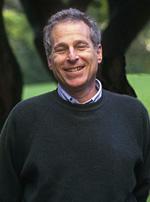Prize Recipient

David Chandler
University of California, Berkeley
Citation:"For the creation of widely used analytical methods and simulation techniques in statistical mechanics, with applications to theories of liquids, chemical kinetics, quantum processes, and reaction paths in complex systems."
Background:David Chandler, Professor at the University of California, Berkeley, received his S.B. degree in Chemistry from MIT in 1966, and his Ph.D. in Chemical Physics at Harvard in 1969. He began his academic career as an Assistant Professor in 1970 at the Urbana-Champaign campus of the University of Illinois, rising through the ranks to become a full Professor in 1977. Prior to joining the Berkeley faculty in 1986, Chandler spent two years as Professor of Chemistry at the University of Pennsylvania.
Chandler's primary area of research is statistical mechanics. His most significant contributions include the development of the Weeks-Chandler-Andersen theory, generally regarded as the basic equilibrium theory of the liquid state, and the Pratt-Chandler theory of hydrophobic effects. Chandler has also created many of the basic techniques with which condensed matter chemical equilibrium and chemical dynamics are understood with molecular theory. His most recent works focus on dynamics and structure far from equilibrium, including processes of self assembly and also the glass transition.
His honors include the Hildebrand and the Theoretical Chemistry Awards from the American Chemical Society, the Bourke and Lennard-Jones Lectureships from the Royal Society of Chemistry, the Hirshfelder Prize from the University of Wisconsin, election to the National Academy of Sciences and election to the American Academy of Arts and Sciences.
Selection Committee:
Steven Sibener (Chair), John Weeks (12/04), Phaedon Avouris ('03 winner) (12/04), Kenneth Jordan (V. Chair)(12/05), Wilson Ho (12/05)
